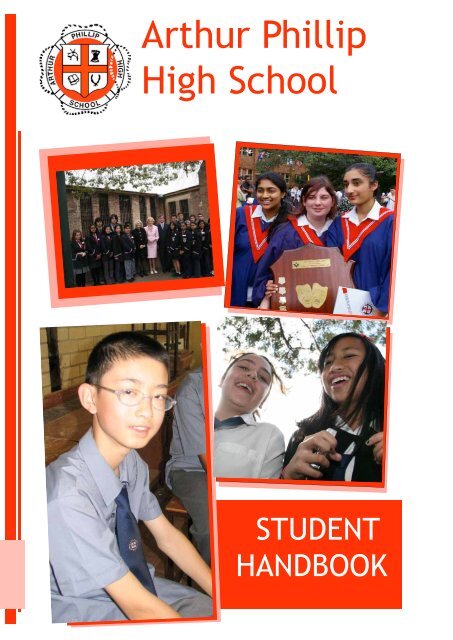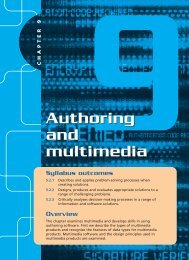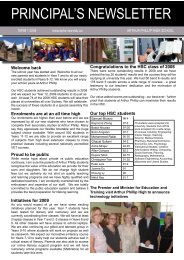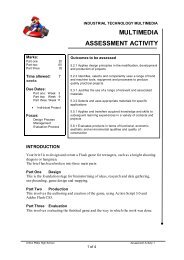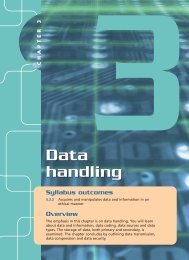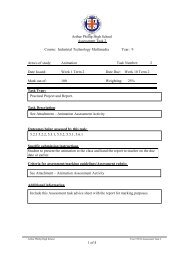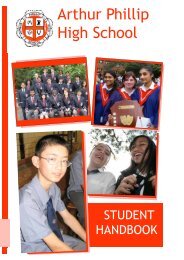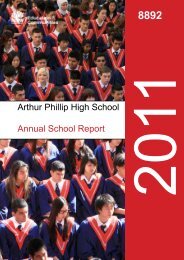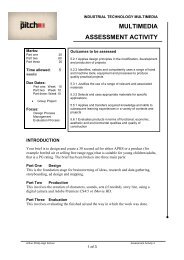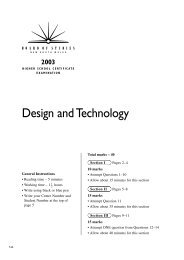handbook - Arthur Phillip High School
handbook - Arthur Phillip High School
handbook - Arthur Phillip High School
- No tags were found...
Create successful ePaper yourself
Turn your PDF publications into a flip-book with our unique Google optimized e-Paper software.
<strong>Arthur</strong> <strong>Phillip</strong><br />
<strong>High</strong> <strong>School</strong><br />
STUDENT<br />
HANDBOOK
Welcome<br />
to<br />
<strong>Arthur</strong> <strong>Phillip</strong> <strong>High</strong> <strong>School</strong><br />
<strong>Arthur</strong> <strong>Phillip</strong> <strong>High</strong> <strong>School</strong> was established in 1875. As a leading technology school for more than a decade<br />
the school has developed a unique approach to personalising learning for every student in all aspects of<br />
literacy/numeracy and study skills. Students and their parents have access to this personalised program<br />
online. Each student has learning targets and can access specific strategies online to assist their learning.<br />
1 to 1 laptop learning has been a feature at the school for many years. The large senior curriculum<br />
provides a wide range of courses to prepare students for HSC and future studies. Some of these courses<br />
are available online and there are also opportunities for gifted students to accelerate their HSC studies. A<br />
flexible timetable for seniors allows them additional time for library research or work placement. Students<br />
have access to all extension HSC classes and ESL staff support international students and newly arrived<br />
students. We are very proud of our strong multicultural tradition and the values students learn about<br />
tolerance of diversity and inclusivity.<br />
This <strong>handbook</strong> has been designed to help you learn about how <strong>Arthur</strong> <strong>Phillip</strong> <strong>High</strong> <strong>School</strong> operates.
Contacting the <strong>School</strong><br />
Principal<br />
Lynne Goodwin Ph: 02 9635 8638<br />
email<br />
lynne.goodwin@det.nsw.edu.au<br />
Administration Office Ph: 02 9635 8638<br />
Fax: 02 9687 1149<br />
<strong>School</strong> address<br />
Macquarie Street<br />
Parramatta 2150<br />
Postal address Locked Bag 5049<br />
Parramatta 2124<br />
<strong>School</strong> website<br />
Learning portal:<br />
www.aphs.nsw.edu.au<br />
http://aphs.edutone.net/uPortal
A message from<br />
the Principal....<br />
Welcome to <strong>Arthur</strong> <strong>Phillip</strong> <strong>High</strong> <strong>School</strong>. We have a very strong historic tradition in Parramatta and are proud<br />
of the way our multicultural education community operates. We are a 21st century city school with 1500<br />
students: one of the largest schools in the state.<br />
We believe our students must also be technologically literate if they are to compete in the complex world of<br />
work in the 21st century. One to one laptop learning has been a feature at the school for many years. We<br />
are pleased to be implementing many new ways of working with technology across the school. We teach<br />
the children of the new millennium: we are keen to ensure our students find school relevant and engaging<br />
so that they are always able to make real world connections with what they are learning.<br />
Our teachers are well trained and committed to excellence. We have implemented quality teaching strategies<br />
across the curriculum. We have introduced innovative IT programs in the junior school to ensure our students<br />
are able to communicate effectively and research using the internet and a range of multimedia programs.<br />
Our senior students perform well in HSC examinations: we offer the full range of courses, including extension<br />
1 and 2 in English and Mathematics. Department of Education data of our students’ performance in all<br />
external examinations indicates that we add significant value for our students.<br />
Our student leadership programs have a strong social justice focus: student leaders represent us at state<br />
and regional levels. A commitment to the rights and responsibilities of effective citizenship is an important<br />
part of the school’s philosophy as a public school.<br />
We are very pleased that we have been given additional funding from the Commonwealth Government<br />
in the form of National Partnerships funding which will will allow us to further enhance the programs and<br />
initiatives already underway for our students.<br />
Lynne Goodwin<br />
Principal<br />
lynne.goodwin@det.nsw.edu.au<br />
Administration Office Ph: 02 9635 8638<br />
Fax: 02 9687 1149<br />
VISIT OUR WEBSITE www.aphs.nsw.edu.au<br />
or email the Principal - lynne.goodwin@det.nsw.edu.au
Our school<br />
<strong>Arthur</strong> <strong>Phillip</strong> <strong>High</strong> <strong>School</strong> is the Parramatta city school with a strong heritage in education.<br />
Our 1875 buildings are the site of some state of the art teaching and learning.<br />
Our students<br />
With 1600 students the school is able to provide a very comprehensive curriculum to cater for all<br />
students across Years 7-12. The school is proud of its strong multicultural tradition and the values<br />
students learn about tolerance of diversity.<br />
Our approach is unique– we emphasise the core basics of literacy and numeracy but we package<br />
them for our modern students by using 21st century digital technologies. As a leading technology<br />
school for more than a decade our school has developed a creative approach to personalising<br />
learning for every student in all aspects of literacy/numeracy and study skills. Students and their<br />
parents have access to this personalised program online. Each student has learning targets and<br />
can access specific strategies online to assist their learning. 1 to 1 laptop learning has been a<br />
feature at the school for many years.<br />
Learning 24/7 – there is never ‘no homework’ at <strong>Arthur</strong> <strong>Phillip</strong>!<br />
Every student has clear learning targets and access to online exercises to improve their skills in<br />
literacy and numeracy.<br />
Our challenges<br />
We want to ensure that every student improves their performance – our value added data<br />
indicates that we are very successful in supporting our students to achieve their potential. We are<br />
constantly adapting our programs to suit the needs of our students. In 2012 there will be extension<br />
HSC classes for students in Years 9 and 10. Band 6 club will operate for senior HSC students.<br />
We need every student to attend school punctually every day to maximise their learning<br />
opportunities.<br />
You can have online access to your child’s records<br />
You are able to access your child’s records and information at home. This includes information<br />
about their:<br />
- attendance<br />
- timetable<br />
- letters sent home<br />
- eliteracy and numeracy progress<br />
- awards<br />
- forms<br />
You can apply to get a password to access this<br />
by emailing the school: contact@aphs.nsw.edu.au
The people you may need to know<br />
@ <strong>Arthur</strong> <strong>Phillip</strong> <strong>High</strong> <strong>School</strong><br />
SENIOR EXECUTIVE<br />
Principal<br />
Deputy Principal<br />
Deputy Principal<br />
Deputy Principal<br />
HEAD TEACHERS<br />
Secondary Studies<br />
Teaching and Learning<br />
Teaching and Learning<br />
Teaching and Learning<br />
Teaching and Learning<br />
Learning Support<br />
Secondary Studies<br />
Welfare<br />
Special Education<br />
English<br />
Mathematics<br />
Science<br />
Social Sciences<br />
History<br />
PDHPE<br />
TAS<br />
Creative and Performing Arts<br />
Teacher Mentor<br />
Attendance<br />
Ms Lynne Goodwin<br />
Ms F O’Brien<br />
Mr B Main<br />
Ms K Gonano<br />
Ms A Heath<br />
Mr D Milligan<br />
Ms M Anastopoulos (rel)<br />
Ms G Krix<br />
Ms S Pinzin<br />
Ms A Lee<br />
Ms J Duric<br />
Ms C Barton<br />
Ms V Wicks<br />
Ms M Phipps<br />
Ms V Kiaos<br />
Mr A Burn<br />
Ms M Tatsis / Ms C Lee<br />
Mr P Murkins<br />
Mr T Bollard<br />
Mr N Train<br />
Ms S Schieb<br />
Ms J Coveney<br />
Ms K Pupo/Ms D Saab<br />
STUDENT ADVISERS<br />
Year 7<br />
Year 8<br />
Year 9<br />
Year 10<br />
Year 11<br />
Year 12<br />
<strong>School</strong> Counsellor(s)<br />
Careers Adviser<br />
Sports Organiser<br />
Librarian<br />
<strong>School</strong> Administration Manager<br />
Ms K Shaw<br />
Mr D Saab Mr George Retsos<br />
Ms S Fitsimanu<br />
Ms K Jones<br />
Ms P Lewis<br />
Ms A Heath Ms J Duric<br />
Ms M Frakes Mr P Bayes<br />
Ms M Van Bentum<br />
Mr M Howie<br />
Mr T Davis<br />
Mr L Willmott
Curriculum for Years 7 - 10<br />
YEAR 7 YEAR 8 YEAR 9 YEAR 10<br />
English English English English<br />
Mathematics Mathematics Mathematics Mathematics<br />
Science Science Science Science<br />
History & Geography History & Geography History & Geography History & Geography<br />
PD Health PE PD Health PE PD Health PE PD Health PE<br />
Music Music Integrated Sport Integrated Sport<br />
Visual Arts<br />
Visual Arts X ELECTIVE X ELECTIVE<br />
Language<br />
Technology<br />
Integrated Sport<br />
Technology<br />
Integrated Sport<br />
Commerce<br />
Industrial Technology Electronics<br />
Information and Software Technology<br />
Photography and Digital Media<br />
Physical Activity and Sports<br />
Studies<br />
Drama<br />
Food Technology<br />
History Elective<br />
Industrial Technology Multimedia<br />
Information Processes and<br />
Technology (accelerated year 11<br />
course)<br />
Commerce<br />
Physical Activity and Sports<br />
Studies<br />
Information and Software<br />
Technology<br />
Industrial Technology Electronics<br />
Industrial Technology Wood<br />
Drama<br />
French<br />
Music<br />
Y ELECTIVE<br />
Information and Software Technology<br />
Graphics Technology<br />
Visual Art<br />
Industrial Technology Electronics<br />
Industrial Technology Wood<br />
Drama<br />
Design and Technology<br />
Physical Activity and Sports Studies<br />
Y ELECTIVE<br />
Commerce<br />
Information and Software Technology<br />
Graphics Technology<br />
Industrial Technology Multimedia<br />
Dance<br />
Design & Technology<br />
Earth and Environmental Studies<br />
History elective<br />
Physical activity and sports<br />
Textiles technology<br />
Z ELECTIVE<br />
Commerce<br />
Food Technology<br />
Information and Software Technology<br />
Industrial Technology Metal<br />
Dance<br />
Industrial Technology Wood<br />
Textiles Technology<br />
Work Education<br />
Creative Computing Compositions
Curriculum for Year 11 2013<br />
LINE 1 LINE 2 LINE 3 LINE 4 LINE 5 LINE 6<br />
Standard English<br />
Ancient History Biology<br />
Business Studies Ancient History<br />
Mathematics<br />
Sport, Lifestyle<br />
and Recreation<br />
Work Studies<br />
Legal Studies<br />
English Studies<br />
CEC<br />
Mathematics<br />
Photography,<br />
Video and Digital<br />
Imaging<br />
Biology<br />
Business Studies<br />
Chemistry<br />
Economics<br />
Business<br />
Services VET<br />
Business<br />
Studies<br />
Community and<br />
Family Studies<br />
Design and<br />
Technology<br />
Biology<br />
Dance<br />
Construction<br />
VET<br />
Geography<br />
Biology<br />
Chemistry<br />
Business Services<br />
Curriculum<br />
Framework<br />
Economics<br />
Work Studies<br />
Food Technology<br />
Hospitality VET<br />
English<br />
Fundamentals<br />
Information<br />
Processes &<br />
Technology<br />
Hospitality<br />
VET<br />
Industrial<br />
Technology<br />
French<br />
Software Design<br />
& Development<br />
Information<br />
Processes &<br />
Music<br />
Multimedia<br />
Drama<br />
Technology<br />
(accelerated course)<br />
Modern<br />
History<br />
Physics<br />
Senior Science<br />
Legal Studies<br />
Retail Services<br />
VET<br />
Textiles and<br />
Design<br />
Industrial<br />
Technology<br />
Timber<br />
Information<br />
Processes &<br />
Technology VET<br />
Modern History<br />
PDHPE<br />
Sport Leisure and<br />
Recreation CEC<br />
Senior Science<br />
Sport Lifestyle<br />
and Recreation<br />
Visual Arts<br />
Visual Arts<br />
Visual Design<br />
Physics<br />
Society and<br />
Culture<br />
Information<br />
Processes &<br />
Technology VET
Curriculum for Year 12 2013<br />
LINE 1 LINE 2 LINE 3 LINE 4 LINE 5 LINE 6<br />
English<br />
Business Studies Ancient History Biology<br />
Business Studies Ancient History<br />
Mathematics<br />
Sport Lifestyle<br />
and Recreation<br />
Work Studies<br />
English<br />
Mathematics<br />
Information<br />
Technology VET<br />
Biology<br />
Chemistry<br />
Construction VET<br />
Business Services<br />
VET<br />
Business Studies<br />
Community and<br />
Family Studies<br />
Biology<br />
Dance<br />
Furniture Making<br />
VET<br />
Biology<br />
Chemistry<br />
Business Services<br />
VET<br />
Photography,<br />
Video and Digital<br />
Imaging<br />
Earth &<br />
Environmental<br />
Science<br />
Design &<br />
Technology<br />
Hospitality VET<br />
Economics<br />
Food Technology<br />
Hospitality VET<br />
Information<br />
Processes &<br />
Technology<br />
Economics<br />
English<br />
Fundamentals<br />
Exploring Early<br />
Childhood<br />
Industrial<br />
Technology -<br />
Graphics<br />
Industrial Technology<br />
multimedia<br />
Industrial Technology<br />
Timber<br />
French<br />
Software Design<br />
& Development<br />
Drama<br />
Legal Studies<br />
Geography<br />
Information Processes<br />
and Technology<br />
PDHPE<br />
Modern<br />
History<br />
Physics<br />
Legal Studies<br />
Music<br />
Modern History<br />
Physics<br />
Sport Leisure and<br />
Recreation CEC<br />
Senior Science<br />
Retail Services<br />
VET<br />
Textiles & Design<br />
Society and<br />
Culture<br />
Sport Lifestyle &<br />
Recreation<br />
Visual Arts<br />
Visual Arts<br />
Senior Science<br />
Visual Design
Literacy and numeracy @ APHS<br />
Supporting students to experience success in literacy and numeracy is the priority for all school<br />
projects and planning. At <strong>Arthur</strong> <strong>Phillip</strong> we believe literacy provides the foundation for successful<br />
student engagement and improvement. <strong>High</strong> expectations of all students and their ability to<br />
achieve underpins all of our initiatives. Classes are organised to maximise the learning needs of<br />
all students. Our students are tested regularly and this data is used to place them in appropriate<br />
classes to provide tailored literacy and numeracy programs targeting your child’s needs. There<br />
is also a specific ESL class in every year group so that our specialist ESL teachers can provide<br />
support for our new arrivals.<br />
Student engagement is enhanced when we provide 21st century delivery; hence our high tech<br />
wi fi campus and continuing focus on learning via laptops.<br />
In 2013 we will continue our innovative approaches through our literacy and ALERT programs.<br />
Staff have been developing these courses for all students in Years 7-10. These programs will<br />
target literacy and technology skills across key learning areas. They have been designed to help<br />
all our students develop the essential skills they will need to be successful at high school.<br />
All Year 7 students will complete initial literacy and numeracy benchmark testing to determine the<br />
levels of support they will need. Our staff will then implement a range of programs to suit your<br />
child’s needs including extension, ESL and learning support programs. Our aim at all times is to<br />
improve your child’s achievement in literacy and numeracy.<br />
Students will complete a range of activities targeting specific reading and writing skills.
<strong>Arthur</strong> <strong>Phillip</strong> <strong>High</strong> <strong>School</strong> hosts an after hours Technology Learning Centre (TLC) for students in the<br />
school library. The centre is operational Monday to Thursday from 3:00pm to 4.30pm in the school library.<br />
It is supervised and delivered by school staff.<br />
The purpose of the centre is to:<br />
• develop each student’s literacy and numeracy skills<br />
• assist with homework<br />
• develop each student’s technology skills<br />
• provide personalised tuition tailored to each student’s needs.<br />
ALERT is the literacy program that has been adopted at<br />
<strong>Arthur</strong> <strong>Phillip</strong> <strong>High</strong> <strong>School</strong>. The acronym stands for ‘Activates<br />
Links for Effective Reception and Transference’. Students are<br />
engaged through various teaching and learning styles; visual,<br />
auditory and tactile, to provide them with the tools to readily<br />
recall literacy strategies. Colours and symbols are important<br />
features of the ALERT Program.<br />
The program has five components: reading/comprehension, writing, grammar, editing and<br />
phonics/spelling. At <strong>Arthur</strong> <strong>Phillip</strong>, we have addressed the areas of reading/comprehension, writing<br />
and editing in Years 7-9. The ALERT Program is taught in English classes and an ‘ALERT teacher’<br />
visits classes twice a week for thirty minutes to teach the program. These lessons are planned to<br />
complement the English curriculum. Classroom teachers use elements of the program to enhance<br />
understanding of course content and literacy needs.<br />
The school has recently purchased twelve Interactive Whiteboards that will be fundamental to the<br />
teaching of the ALERT Program. This allows for the colours and symbols to be readily available<br />
and fully utilised in the classroom and allows for student interaction and engagement.<br />
English Assessment Tasks have been adapted to assess understanding of the program.<br />
In particular, students are now assessed on their planning and editing, which has ensured<br />
improvement in overall results and also the quality of written responses.<br />
The ALERT Program is currently being adopted across all Key Learning Areas at <strong>Arthur</strong> <strong>Phillip</strong><br />
<strong>High</strong> <strong>School</strong> and the English Faculty is revising all teaching and learning programs to cater for the<br />
program.<br />
APHS Homework Centre<br />
There are three ways of participating in the TLC:<br />
1. Years 9-12 self-nominating students to participate and attend<br />
2. Years 7-12 students participating in the Refugee Action Support Program (RASP)<br />
3. Years 7-8 self-nominating students through the laptop learning centre initiative.<br />
The privilege of attending the centre may be withdrawn for students who behave in a disruptive or<br />
inappropriate manner. Laptop privileges may be withdrawn for students who do not attend the TLC.<br />
Afternoon tea is provided for students attending the TLC.
Technology<br />
Laptop Program<br />
In 2013 we are continuing our laptop program for Years 7 and 8 where students may choose<br />
to lease their own laptop to be used in class. We would like students to have access to<br />
technology at home and at school. <strong>High</strong> tech tools serve as an extension of the students’<br />
thoughts and learning process. The laptop can provide a place to explore ideas, research<br />
questions, test hypotheses, compose thoughts and come to conclusions – in other words, to<br />
learn.<br />
We believe our 21st century students are the first truly digital generation. They live and learn<br />
differently than children from even a few years ago. Digital students often multi-task in ways that<br />
previous generations could not imagine.<br />
We want school to be engaging, interesting and relevant to the lives of our students. We want<br />
them to be able to demonstrate excellent analytical skills, to engage in critical<br />
thinking and problem solving and to collaborate more effectively on school work.<br />
Our school is ready: we are widely acknowledged for our innovative curriculum and<br />
learning goals. We have a wireless environment and teachers who integrate technology into<br />
their teaching and learning programs. We host many international visitors who regard our<br />
technology implementation as world class.<br />
The laptop is still a technology tool – we know our success will be determined through teaching<br />
and learning programs characterised by high academic rigour, real-world<br />
experiences and high quality teaching that incorporates research on how people learn best.<br />
Students in Years 9-12 will receive Lenovo laptops to use for their senior study. Years 7-8 can<br />
lease a similar laptop for $50 per term.<br />
We have an online portal for staff, students and parents for online learning and communication<br />
across our wide community. Students and their parents are able to access their literacy and<br />
numeracy profiles and a personalised learning program at home and at school.<br />
This includes information about their:<br />
1. attendance<br />
2. timetable<br />
3. letters sent home<br />
4. literacy and numeracy progress<br />
5. awards<br />
6. forms
APHS<br />
behaviour<br />
management<br />
At <strong>Arthur</strong> <strong>Phillip</strong> <strong>High</strong>, we would like our<br />
students to become responsible for their<br />
behaviour and learning. Most students will<br />
learn this easily and naturally but sometimes<br />
during adolescence, they will need some extra<br />
support because things can sometimes go<br />
wrong. The Stages system is designed to help<br />
them if they need to get back on track so that<br />
they can become responsible young adults<br />
and successful learners.<br />
system<br />
What happens when my behaviour is unacceptable How the system works....<br />
STAGE 1<br />
I am behaving inappropriately.<br />
I need to speak to my class teacher about how I can<br />
improve.<br />
If I need to, I can talk to my Student Adviser.<br />
STAGE 2<br />
I am trying but it’s not working out in class.<br />
I need to write down what is going wrong on a blue<br />
sheet and talk to my class teacher again.<br />
STAGE 3<br />
I can’t get it right.<br />
I am behaving inappropriately in class and my schoolwork<br />
is not up to date. Each lesson my teacher keeps track of<br />
my work on an orange sheet.<br />
I need to talk to the Head Teacher. I can get help or<br />
advice from my Student Adviser, the <strong>School</strong> Counsellor<br />
or the Head Teacher Welfare. My parents will be told that<br />
I am having problems at school.<br />
At any stage, if my<br />
behaviour improves I<br />
can return to normal<br />
class routine and work<br />
towards receiving<br />
commendations.<br />
If I reach Stage 3 in more than one subject I<br />
will be on an Improvement Program to help<br />
me get back on track.<br />
STAGE 5<br />
If behaviour is totally unacceptable during class, in the<br />
playground, at sport, on the buses or on an excursion I<br />
will reach Stage 5 Suspension.<br />
STAGE 4<br />
My behaviour is offending students and<br />
teachers. It is stopping other students from<br />
learning. I will be issued with a hot pink<br />
booklet. Teachers will monitor my attendance<br />
/ behaviour in every class and I will need to<br />
show the pink book to the Deputy Principal<br />
each afternoon. My parents will be asked to<br />
sign this book each night.<br />
I am suspended from school until my parents<br />
attend an interview with the Principal or the<br />
Deputy Principal.
APHS - welfare policies<br />
All students in NSW schools<br />
are expected to:<br />
• Attend every school day, unless they are legally excused,<br />
and be in class on time and prepared to learn.<br />
• Maintain a neat appearance, including adhering to the<br />
requirements of the school’s uniform or dress code<br />
policy.<br />
• Behave safely, considerately and responsibly, including<br />
when travelling to and from school.<br />
• Show respect at all times for teachers, other school staff<br />
and helpers, including following class rules, speaking<br />
courteously and cooperating with instructions and<br />
learning activities.<br />
• Treat one and other with dignity and respect.<br />
• Care for property belonging to themselves, the school<br />
and others.<br />
BULLYING – IT’S NOT FOR US!<br />
Public schools are inclusive educational institutions where<br />
diversity is affirmed and individual differences are respected.<br />
As a community <strong>Arthur</strong> <strong>Phillip</strong> <strong>High</strong> <strong>School</strong> values cooperation,<br />
respect for others and responsibility. The focus of quality<br />
education is for students to learn and grow with confidence.<br />
Students develop best in schools where teaching and learning<br />
occur in a context of student welfare. Every student has<br />
the right to learn within a secure, happy, fair and supportive<br />
environment. Bullying is not acceptable at <strong>Arthur</strong> <strong>Phillip</strong> <strong>High</strong><br />
<strong>School</strong>.<br />
What is Bullying<br />
Bullying can be defined as intentional, repeated behaviour<br />
by an individual or group of individuals that causes distress,<br />
hurt or undue pressure to another person. Bullying includes<br />
teasing, exclusion, abuse, threats, malicious gossip, assault<br />
and property damage.<br />
Bullying<br />
• Devalues, isolates and frightens.<br />
• Affects an individual’s ability to achieve.<br />
• Has long-term effects on those engaging in bullying<br />
behaviour.<br />
Signs of bullying:<br />
• Bruises, scratches or cuts that your child can’t really<br />
explain.<br />
• Torn or damaged clothing.<br />
• Damaged or missing belongings.<br />
• Headaches, stomach aches and other pains that the child<br />
can’t put a finger on.<br />
• Unexplained tears or depression.<br />
• Unusual outbursts of temper.<br />
• Not wanting to go to school.<br />
• Not wanting to play with friends.<br />
• Wanting changes in the way he or she travels to and from<br />
school.<br />
• <strong>School</strong> work falls off in quality.<br />
• Wanting extra money without giving a reason.<br />
What you can do:<br />
• Tell your teacher immediately. You may also tell your<br />
Year Adviser, Head Teacher Welfare and <strong>School</strong><br />
Counsellors.<br />
• Your Year Adviser will be notified by either yourself or one<br />
of the above mentioned people.<br />
• Where the bullying involves serious physical assault,<br />
you should immediately report the incident to either the<br />
Deputy Principals or the Principal.<br />
What should parents do<br />
• Encourage your children to understand the<br />
unacceptability of bullying as much as possible. A<br />
thorough reading of this policy with your children is highly<br />
recommended.<br />
• Encourage your children to follow the procedures<br />
outlined above if they are being bullied.<br />
• Contact the school if your child’s efforts to deal with<br />
bullying do not appear to be working. Discussion of<br />
preventative strategies with your child over this matter is<br />
also recommended.<br />
We must all:<br />
• Involve the children in making decisions about what to do.<br />
• Listen to what children say.<br />
• Assure children that we understand.<br />
Kids – Are you ‘copping’ a hard time from others<br />
• Ignore the attempted bullying.<br />
• Find allies and use them for support.<br />
• Remove yourself from the situation.<br />
ALWAYS REMEMBER TO TELL SOMEONE !<br />
Bullying behaviour can be:<br />
• Verbal e.g. name calling, teasing, abuse, putdowns,<br />
sarcasm, insults and threats.<br />
• Physical e.g. hitting, punching, kicking, scratching,<br />
tripping and spitting.<br />
• Social e.g. ignoring, excluding, ostracising, alienating<br />
and making inappropriate gestures.<br />
• Psychological e.g. spreading rumours, dirty looks, hiding<br />
or damaging possessions, malicious SMS and email<br />
messages, inappropriate use of camera phones.<br />
Behaviour that infringes on the safety of others, such as harassment, bullying and<br />
illegal or anti-social behaviour of any kind, will not be tolerated.
<strong>School</strong> Uniform Policy<br />
The <strong>Arthur</strong> <strong>Phillip</strong> <strong>High</strong> <strong>School</strong> uniform promotes the school’s image in the general community. If students<br />
value themselves and the community values the school, our references and reports will be a major<br />
advantage in seeking employment. As well, uniforms are worn to promote the safety of students. If an<br />
intruder does enter the school, they will be very obvious. It is in the best interests of the school and<br />
students alike that full school uniform be worn to school at all times. <strong>School</strong> uniforms are designed to<br />
be neat, practical and of good quality. They help a student to maintain high personal standards, high<br />
self-esteem and they help promote and enhance school pride and school tone.<br />
get the look ...<br />
WINTER<br />
Navy blue skirt or pants<br />
in any plain style with<br />
button through plain<br />
white school blouse<br />
<strong>School</strong> tie<br />
Navy blue or black tights<br />
Junior school sloppy joe<br />
AND/OR<br />
<strong>School</strong> zippered jacket/<br />
school blazer<br />
Navy<br />
Blue<br />
Pants<br />
Junior Girls 7 to 10 9<br />
Navy<br />
Blue<br />
Skirt<br />
SUMMER<br />
Navy blue skirt in any plain<br />
style with button through<br />
plain white school blouse<br />
(not sport t-shirt)<br />
<strong>School</strong> tie<br />
White socks<br />
Strong black leather<br />
school shoes<br />
10<br />
Junior Boys 7 to 9<br />
Grey<br />
Trousers<br />
SUMMER<br />
Plain grey school shirt<br />
<strong>School</strong> tie<br />
<strong>School</strong> grey shorts<br />
OR<br />
<strong>School</strong> grey trousers<br />
Grey socks<br />
Strong black leather school shoes<br />
WINTER<br />
Same as Summer uniform with<br />
Junior school sloppy joe<br />
AND/OR<br />
<strong>School</strong> zippered jacket<br />
<strong>School</strong> blazer<br />
P.E. Uniform<br />
<strong>School</strong> Cap<br />
- Navy Blue<br />
Navy blue taslon<br />
shorts<br />
APH sports shirt<br />
Non-marking sports shoes<br />
NOTE: a new tracksuit will also be<br />
available for 2009
Dress for success!<br />
SENIOR STUDENTS YEARS 11-12<br />
Senior girls wear white shirts and grey skirts or trousers and senior boys wear white<br />
shirts and grey trousers. All students wear a school tie.<br />
Senior Girls<br />
Senior Boys<br />
Grey<br />
Skirts<br />
Jackets and Jumpers<br />
Grey<br />
Trousers<br />
Senior<br />
Junior<br />
Boys<br />
Girls<br />
Sport only!<br />
WHERE DO I BUY MY UNIFORM <br />
Uniforms are available from Lowes<br />
Westfield Parramatta
Attendance monitoring<br />
12
Some of our rules...<br />
Mobiles<br />
1) Mobile Phones<br />
- If you bring a mobile phone to school it must<br />
remain in your bag during lessons.<br />
- Mobile phones must NOT be turned on<br />
during lesson time.<br />
- If you produce a mobile phone during a lesson, or if a mobile phone rings,you<br />
will be sent to the Deputy Principal with a note. The Deputy Principal will then<br />
take responsibility for the phone. At the end of the school day you will need to<br />
report to the Deputy Principal and your phone will be returned to you.<br />
2) Valuables<br />
- If you bring valuables to school, including mobile phones, MP3’s, wallets,<br />
jewellery etc. you must accept the risk that these items may be lost.<br />
- Your teacher is not responsible for the security of these items during<br />
lessons. The school is not responsible for these items at recess or lunchtimes<br />
and before or after school.<br />
- We do not encourage you to bring items of value into the school.<br />
NOT IN CLASS !<br />
MP3’s<br />
NOT IN CLASS !<br />
Take care of your valuables !
<strong>School</strong> procedures you need to follow<br />
If I have been absent from school<br />
I need to bring a note signed by my parent or guardian. The note needs to clearly explain the<br />
reason for my absence.<br />
Note: If a student plans to be absent from school for more than fifteen (15) days then a<br />
certificate of exemption from attendance at school approved by the principal is required.<br />
If I am late to school<br />
I report directly to the Student Services to obtain a late pass. I must then go directly to my<br />
class.<br />
If I am late to class<br />
I need to have a note from the teacher who detained me and give this to my teacher.<br />
If I need to leave school early<br />
I need to bring a note signed by my parent or guardian. The note needs to clearly explain<br />
the reason for my leaving early. This note is to be presented to Student Services before<br />
school and an early leaver’s pass will be issued. I will show this to my teacher at the time I<br />
am to leave and will present it the Police or Home <strong>School</strong> Liaison if required.<br />
If I need to go to the toilet during class time<br />
It is my responsibility to use the toilets during recess and lunch breaks. In case of an<br />
emergency during class time, I must get a toilet pass from my teacher and collect the toilet<br />
key from Student Services. I must take my student ID card with me.<br />
If I feel sick or have an accident<br />
If I have an accident, I must report to the nearest teacher for help.<br />
If I feel sick, I must inform my teacher who will give me a note to go the sick bay at Student<br />
Services. My parents will be contacted if I need to go home.<br />
If I am out of uniform<br />
I will bring a note from home<br />
If I am moving to another school or leaving school<br />
I will bring a note signed by my parent or guardian. This note is to be presented to Student<br />
Services who will help me with transfer arrangements and clearance procedures.<br />
If I lose property<br />
I check for its return at Student Services.
Scenes of school life...
Our Core Values<br />
Respect, Responsibility, Safe Positive Learning<br />
These Values have been constructed through an action research plan to improve student<br />
behaviour and create a positive working environment for all staff and students.<br />
These Core Values have been selected by all groups in our school community, students, teachers,<br />
parents and community members as the values most important in our school community.<br />
Students are taught these values explicitly at the beginning of the school year along with the<br />
school rules.<br />
The Core Values are incorporated into our teaching and learning programs across KLA areas and<br />
an Integral part of all welfare polices and procedures including behaviour and bullying.<br />
From the success of the teaching and learning of these values students were also selected on a<br />
community team to construct Values in the Parramatta Community.<br />
The Values that all students should demonstrate in the Parramatta Community are: Respect,<br />
Responsibility and Care. These Values are posted at the Parramatta interchange and are<br />
supported by all of our community members


